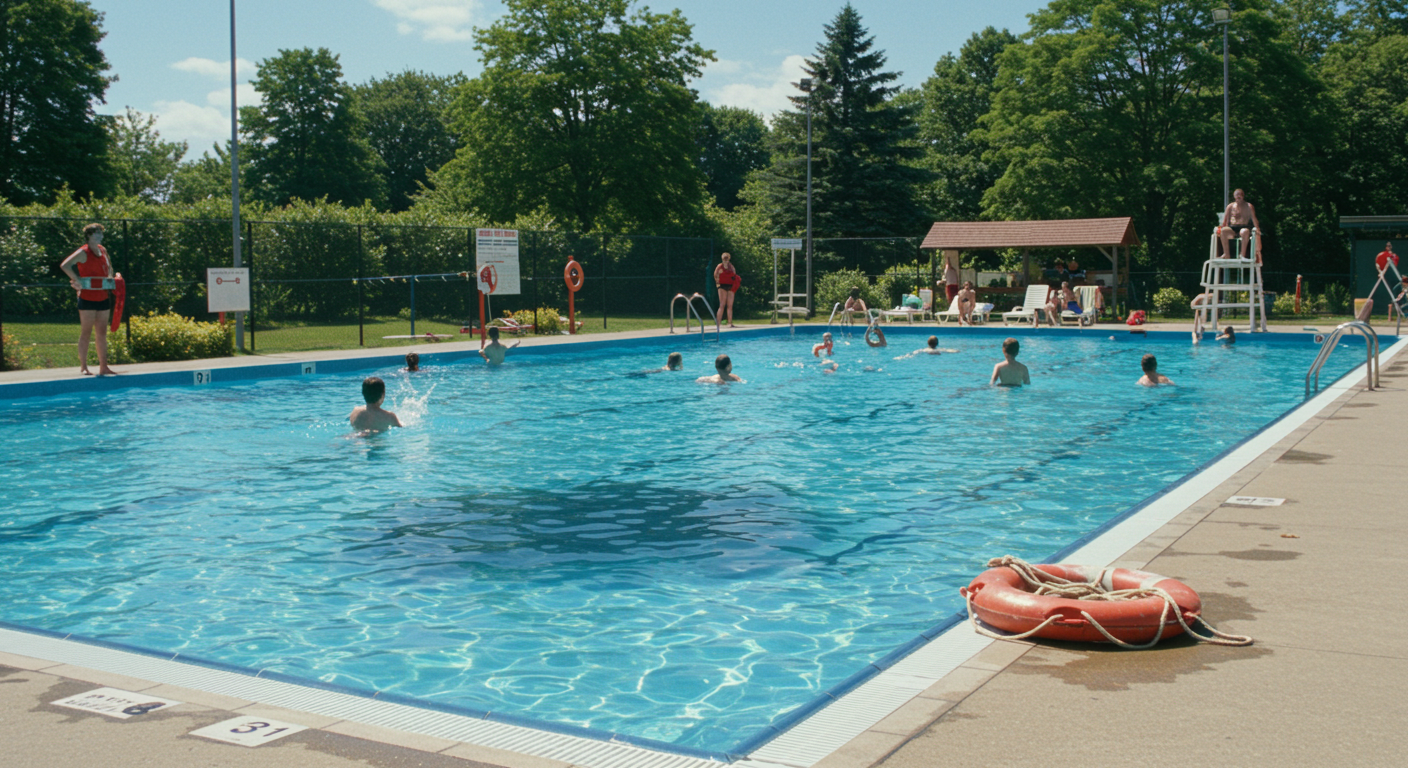Swimming pools are a dream come true for many homeowners. They often evoke images of good fun in the sun and summertime barbecues. Rarely do we think about the potential hazards that come with owning one.
According to the Consumer Product Safety Commission, about 6,300 pool-related injuries occur each year in the United States. Wisconsin sees its share of these incidents, especially during our beautiful but brief summer months.
This article explains the legal principles behind swimming pool liability in Wisconsin. You’ll learn who can be held responsible and under what circumstances. Whether you’re a pool owner or just enjoy swimming at your friend’s place, understanding these principles could save you from legal troubles down the road.
Note: This article is for informational purposes only and not legal advice. Please consult with an attorney for specific legal guidance.
Types of Swimming Pool Accidents and Injuries
When you think about pool accidents, drowning might be the first thing that comes to mind. But the reality is more complex. Pool-related injuries can happen in many different ways:
- Drowning and Near-Drowning: The most serious type of accident. It happens when someone stays underwater too long, cutting off oxygen to their brain. Even survivors can face long-term health issues.
- Slip and Fall Accidents: We’ve all seen the “No Running” signs at our local pool. Wet surfaces and uneven decks are major hazards around pools.
- Diving Injuries: These often happen when someone dives into shallow water. The results can be devastating – spinal cord injuries, head trauma, or worse.
- Entrapment: This scary situation occurs when someone gets trapped by pool drains or suction outlets. Modern pools must have special drain covers to prevent this.
- Chemical Burns: Too much chlorine or other chemicals can cause serious skin injuries.
- Infections: On the other hand, contaminated water can make swimmers sick. That’s why proper pool maintenance is crucial.
- Equipment Malfunction: Broken ladders, damaged diving boards, or faulty pool equipment can lead to serious injuries.
Legal Principles of Liability in Wisconsin
A swimming pool accident often brings panic, strong emotions, and confusion. Understanding Wisconsin’s legal principles helps you know if you have a case for compensation.
Premises Liability
Let’s say you’re hosting a 4th of July party. Your extended family is coming over, including young children. As a property owner, you must take reasonable steps to keep your pool area safe. This means having a fenced pool area, a locked gate, and fixing hazards like broken ladders or slippery surfaces.
Remember – this applies to invited guests and people with a right to be there (like delivery drivers). Trespassers are a different story.
Duty of Care
Let’s elaborate on the issue of visitors. Wisconsin law recognizes three types of visitors, each with different levels of protection. Invitees get the highest protection. These are people you invite over, like guests at a public pool or hotel pool. Pool owners must actively look for hazards and warn about dangers.
Licensees are social guests at private pools. You must warn them about known dangers that aren’t obvious. Finally, trespassers usually get no protection except from intentional harm. But watch out – there’s a special rule for child trespassers! More on this later.
Negligence
Most pool accident claims stem from negligence – when someone fails to take reasonable care. You don’t need bad intentions to be legally responsible. Here’s what matters:
- Duty: Did you owe someone a duty of care?
- Breach: Did you fail to meet that duty?
- Causation: Did your failure cause the accident?
- Damages: Was someone hurt as a result?
Wisconsin Safe Place Statute
Wisconsin’s Safe Place Statute (Wis. Stat. § 101.11) sets higher safety standards for public pools than private ones. This law affects:
- Municipal pools
- Hotel pools
- Apartment complex pools
- Water parks
- School pools
The statute requires these facilities to make their pools “as safe as the nature of the premises reasonably permits.” This means:
- Regular professional inspections
- Prompt repairs of any hazards
- Proper staffing with trained personnel
- Comprehensive safety equipment
- Clear warning signs and rules
- Proper lighting and ventilation
While this statute doesn’t apply to private homeowners, it’s worth understanding if you use public pools or get injured at one.
Attractive Nuisance Doctrine
Here’s where things get interesting. We’ve all heard of those neighborhood kids who sneak into pools on hot summer days. Under this doctrine, pool owners might be liable for their injuries – even if the kids were trespassing!
According to Wisconsin law, property owners must take extra precautions when they have something that naturally attracts children – like a swimming pool. For instance, there should be non-climbable fencing with openings no larger than 4 inches.
Who Can Be Held Liable In Wisconsin Pool Accidents?
Let’s say you got hurt at a pool, and it wasn’t your fault. Who might be responsible?
- Homeowners: Private pool owners who fail to maintain safe conditions.
- Commercial Pool Operators: Think hotels or water parks that don’t follow safety rules.
- Municipalities: Cities running public pools must follow strict safety guidelines.
- Lifeguards: They can be liable if they fail to watch the water properly.
- Equipment Manufacturers: Any equipment related to the pool should be in good standing. For instance, if the company shipped you a faulty drain cover, they could be responsible.
- Pool Maintenance Companies: In some cases, people pay to have their pool maintained with the guarantee that the job will be done right.
Specific Liability Scenarios and Wisconsin Law
Next, let’s examine common scenarios where liability issues arise with relevant Wisconsin laws and regulations:
- Inadequate Supervision:Wisconsin Administrative Code Chapter ATCP 76.22 requires qualified lifeguards at public pools. Violation can mean legal trouble.
- Lack of Safety Equipment: Public pools must have specific safety equipment under Wis. Admin. Code § ATCP 76.26.
- Unsafe Pool Design: Cracked tiles or broken ladders can lead to serious injuries.
- Failure to Warn: “No Diving in Shallow Water” or “No Running” signs should be present and easy to see. See ATCP 76.29 Posting pool rules.
Wisconsin’s Recreational Use Statute
Wisconsin’s Recreational Use Statute (Wis. Stat. § 895.52) can protect property owners who let people use their land for fun – including swimming. But there’s a catch: you can’t charge admission fees, and you can’t act maliciously.
This protection doesn’t apply to social guests or if you charge fees. And if you deliberately create dangerous conditions, you’re still liable.
What to Do After a Swimming Pool Accident in Wisconsin
We hope you never need this advice, but swimming pool accidents happen even to people who are careful. When they do, staying calm and taking the right steps can make a huge difference in protecting your health and legal rights.
- Seek Medical Attention: Don’t wait to get checked out. Some injuries, like near-drowning, can have delayed symptoms. Even if you feel fine, see a doctor.
- Report the Incident: Tell the pool owner or operator what happened immediately. If it’s at a public pool or hotel, ask for an incident report and get a copy. Write down the names of any staff members involved.
- Document Everything: Use your phone to take photos of where the accident happened. Capture any hazards like broken equipment, missing signs, or unsafe conditions. Get pictures of your injuries, too.
- Get Witness Information: Did anyone see what happened? Get their names and phone numbers right away. Witnesses often leave quickly, and their accounts can be crucial to your case.
- Preserve Evidence: Keep the clothes and shoes you wore. Don’t wash them. If equipment failure caused your injury, try to get photos or even the actual equipment if possible.
- Contact an Attorney: Pool accident cases can be complex. Evidence disappears quickly, and insurance companies often try to settle fast for less than you deserve. A Wisconsin personal injury lawyer can help protect your rights and make sure you get fair compensation for your injuries.
Conclusion
Swimming pools bring joy, but water is a force of nature that demands respect. Now you understand premises liability, Wisconsin’s Safe Place Statute, and the Recreational Use Statute. If you’re ever involved in a pool accident, don’t go it alone. Talk to a qualified attorney who can protect your rights.
Contact Vanden Heuvel & Dineen, S.C. for experienced legal guidance in Wisconsin swimming pool accident cases.




